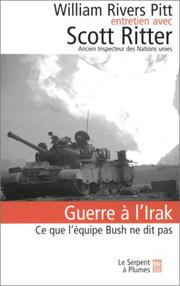| Listing 1 - 7 of 7 |
Sort by
|
Book
Year: 2003 Publisher: Geneva : UNIDIR,
Abstract | Keywords | Export | Availability | Bookmark
 Loading...
Loading...Choose an application
- Reference Manager
- EndNote
- RefWorks (Direct export to RefWorks)

ISBN: 1586480391 Year: 2000 Publisher: New York : PublicAffairs,
Abstract | Keywords | Export | Availability | Bookmark
 Loading...
Loading...Choose an application
- Reference Manager
- EndNote
- RefWorks (Direct export to RefWorks)
Book
Year: 2002 Publisher: London : International Institute for Strategic Studies,
Abstract | Keywords | Export | Availability | Bookmark
 Loading...
Loading...Choose an application
- Reference Manager
- EndNote
- RefWorks (Direct export to RefWorks)

ISBN: 0415397324 Year: 2007 Publisher: Abingdon, UK : Routledge,
Abstract | Keywords | Export | Availability | Bookmark
 Loading...
Loading...Choose an application
- Reference Manager
- EndNote
- RefWorks (Direct export to RefWorks)

ISBN: 1403942579 1349521493 9786610455904 128045590X 0230512585 Year: 2005 Publisher: Basingstoke Palgrave Macmillan UK
Abstract | Keywords | Export | Availability | Bookmark
 Loading...
Loading...Choose an application
- Reference Manager
- EndNote
- RefWorks (Direct export to RefWorks)

ISBN: 2842614062 9782842614065 Year: 2002 Publisher: Paris : Serpent à plumes
Abstract | Keywords | Export | Availability | Bookmark
 Loading...
Loading...Choose an application
- Reference Manager
- EndNote
- RefWorks (Direct export to RefWorks)
En 1998, au terme de sept années de mission en Irak, Scott Ritter et les inspecteurs mandatés par les Nations unies ont confirmé la destruction de l'arsenal d'armes biologiques, chimiques et nucléaires de l'Irak. Pourquoi, dès lors, mener une nouvelle guerre à l'Irak ? Scott Ritter et William Rivers Pitt analysent les raisons d'une guerre annoncée contre l'Irak par la Maison blanche et soulignent l'absence totale de liens entre Al Qaida et Saddam Hussein (d'ailleurs cible d'Oussama Ben Laden, comme de George W. Bush). Scott Ritter et William Rivers Pitt démontrent pourquoi un changement de régime, appelé de leurs voeux par MM. Bush et Blair, est absurde et ne conduirait pas nécessairement à la démocratie dans un pays divisé depuis des siècles. Au final, ils mettent en garde contre les conséquences désastreuses d'une telle action conjointe des forces armées américaines et britanniques
Weapons of mass destruction --- Arms control --- Disarmament --- Verification --- Inspection --- Ritter, Scott --- United Nations. --- Iraq --- United States --- Foreign relations --- 327.5 <73> --- 327.5 <567> --- 623.45 --- Internationale conflicten. Internationale spanningen. Internationale blokvorming. Veiligheidspolitiek--Verenigde Staten van Amerika. VSA. USA --- Internationale conflicten. Internationale spanningen. Internationale blokvorming. Veiligheidspolitiek--Irak --- Munitie. ABC-wapens --- 327.5 <567> Internationale conflicten. Internationale spanningen. Internationale blokvorming. Veiligheidspolitiek--Irak --- 327.5 <73> Internationale conflicten. Internationale spanningen. Internationale blokvorming. Veiligheidspolitiek--Verenigde Staten van Amerika. VSA. USA --- Weapons of mass destruction - Iraq --- Arms control - Verification - Iraq --- Disarmament - Inspection - Iraq --- Ritter, Scott - Interviews --- Iraq - Foreign relations - United States --- United States - Foreign relations - Iraq
Book
ISBN: 0801457610 0801458854 0801478065 9780801458859 9780801447853 0801447852 9780801457616 9780801478062 Year: 2010 Volume: *21 Publisher: Ithaca, N.Y. Cornell University Press
Abstract | Keywords | Export | Availability | Bookmark
 Loading...
Loading...Choose an application
- Reference Manager
- EndNote
- RefWorks (Direct export to RefWorks)
The U.S. government spends enormous resources each year on the gathering and analysis of intelligence, yet the history of American foreign policy is littered with missteps and misunderstandings that have resulted from intelligence failures. In Why Intelligence Fails, Robert Jervis examines the politics and psychology of two of the more spectacular intelligence failures in recent memory: the mistaken belief that the regime of the Shah in Iran was secure and stable in 1978, and the claim that Iraq had active WMD programs in 2002. The Iran case is based on a recently declassified report Jervis was commissioned to undertake by CIA thirty years ago and includes memoranda written by CIA officials in response to Jervis's findings. The Iraq case, also grounded in a review of the intelligence community's performance, is based on close readings of both classified and declassified documents, though Jervis's conclusions are entirely supported by evidence that has been declassified. In both cases, Jervis finds not only that intelligence was badly flawed but also that later explanations-analysts were bowing to political pressure and telling the White House what it wanted to hear or were willfully blind-were also incorrect. Proponents of these explanations claimed that initial errors were compounded by groupthink, lack of coordination within the government, and failure to share information. Policy prescriptions, including the recent establishment of a Director of National Intelligence, were supposed to remedy the situation. In Jervis's estimation, neither the explanations nor the prescriptions are adequate. The inferences that intelligence drew were actually quite plausible given the information available. Errors arose, he concludes, from insufficient attention to the ways in which information should be gathered and interpreted, a lack of self-awareness about the factors that led to the judgments, and an organizational culture that failed to probe for weaknesses and explore alternatives. Evaluating the inherent tensions between the methods and aims of intelligence personnel and policymakers from a unique insider's perspective, Jervis forcefully criticizes recent proposals for improving the performance of the intelligence community and discusses ways in which future analysis can be improved.
Intelligence service --- Iraq War, 2003-2011 --- Weapons of mass destruction --- Evaluation --- Military intelligence --- Evaluation. --- United States. --- Iran --- History --- Anglo-American Invasion of Iraq, 2003-2011 --- Dawn, Operation New, 2010-2011 --- Gulf War II, 2003-2011 --- Iraqi Freedom, Operation, 2003-2010 --- New Dawn, Operation, 2010-2011 --- Operation Iraqi Freedom, 2003-2010 --- Operation New Dawn, 2010-2011 --- Operation Telic, 2003-2011 --- Persian Gulf War, 2003-2011 --- Telic, Operation, 2003-2011 --- Counter intelligence --- Counterespionage --- Counterintelligence --- Intelligence community --- Secret police (Intelligence service) --- Agjencia Qendrore e Inteligjencës --- Central Intelligence Agency (U.S.) --- CIA (Central Intelligence Agency (U.S.)) --- CIP (United States. Centrālās izlūkošanas pārvalde) --- Mei-kuo chung yang chʻing pao chü --- National Security Council (U.S.). --- Si Aing Ei --- T︠S︡entralʹnoe razvedyvatelʹnoe upravlenie SShA --- T︠S︡RU SShA --- T︠S︡RU (T︠S︡entralʹnoe razvedyvatelʹnoe upravlenie SShA) --- ЦРУ США --- ЦРУ (Центральное разведывательное управление США) --- Центральное разведывательное управление США --- ארצות הברית. --- 美國. --- War on Terrorism, 2001-2009 --- Public administration --- Research --- Disinformation --- Secret service --- National Security Council (U.S.) --- CIA (Central Intelligence Agency) --- Polemology --- United States --- Case studies --- United States. Central Intelligence Agency --- Revolution, 1979 --- Iraq --- Intelligence service - United States - Evaluation - Case studies --- Iraq War, 2003-2011 - Military intelligence - United States - Evaluation --- Weapons of mass destruction - Iraq --- Iran - History - Revolution, 1979 --- United States of America
| Listing 1 - 7 of 7 |
Sort by
|

 Search
Search Feedback
Feedback About UniCat
About UniCat  Help
Help News
News